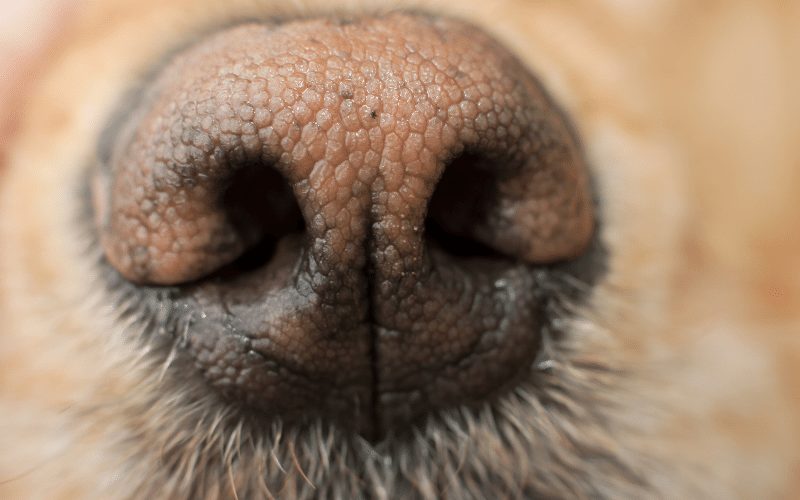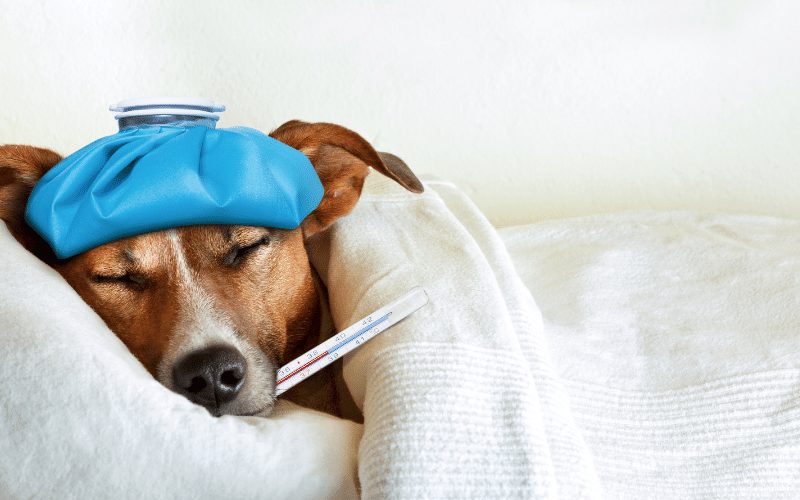Why Does My Dog Keep Sneezing?
May 27, 2021 2021-06-21 6:14
Does your dog ever have sneezing fits where he sneezes without stopping for minutes at a time? While some dog owners never experience this, others have dogs that regularly go through sneezing fits. Why does your dog keep sneezing? Should you see a vet about this? Is there anything you can do to stop it?
Read on to learn more about sneezing in dogs!
Causes Of Sneezing
Sneezing in dogs can have many different causes, from benign to dangerous and from likely to highly uncommon. Let’s look at some of them!
Allergies
Just like people, dogs can be allergic to all kinds of things.
When we think of allergies in dogs, usually food allergies such as a chicken intolerance comes to mind. Some dogs however actually are allergic to certain kinds of grass, pollen or even dust mites. And it is exactly these kinds of allergies that can result in a lot of sneezing!
If your dog sneezes a lot when he is in a certain area – say a dusty part of your house or on a specific walking path – it is likely that his sneezing is caused by allergens.
Smaller dogs are more likely to sneeze from allergies that originate from the ground, just because they are – well – closer to the ground!
If you suspect an allergic reaction in your dog, you should consult with your veterinarian. There are a variety of treatments for allergies which will let your dog enjoy his time outside much more without the dreaded sneezing!
Excitement
Does your dog sneeze in situations that are exciting and stimulating for him? Chances are the excitement is what causes the sneeze. Dogs that like to play with other dogs at dog parks or daycares often sneeze mid-play.

This can be a way for them to process the excitement and fun, and to regulate their arousal.
While it may seem like an unnecessary interruption to us, doggy play actually often has small downtimes built in which lets everyone calm down a bit. Sometimes play can escalate if the involved dogs are very excited and high-strung, so any kind of break your dog takes while playing – whether that be sniffing, stretching, taking a sip of water or sneezing – is going to be beneficial!
Dust
We already mentioned possible allergies against dust mites, but dust itself can also cause a mechanical irritation of the nasal membranes and lead to sneezing. This is once again more prevalent in smaller dogs (such as Cavachons or Chiweenies) as they inhale a lot more dust than a tall one like a King Shepherd!
Dogs that are exposed to a lot of dust often show eye discharge and irritation as well. If you live in a very dry and dusty area, consider wetting down the area of the yard that your dogs play in to avoid excessive irritation of their nose and eyes.
Dogs that dig obsessively can also inhale a lot of dust. For multiple reasons obsessive digging should not be allowed, and the potential sneezing fits are one of them.
Nasal Mites

Canine nasal mites are very common and can affect any kind of dog, though they are a bit more likely in large dogs and dogs well into their adult life (over the age of 3). A dog can get infected with mites by playing with another dog that has them. Nasal mites not only cause sneezing fits but also bleeding from the nose, head shaking and coughing.
If you suspect that your dog could have nasal mites, have him seen by a veterinarian. Your vet can diagnose nasal mites through examination with a scope and nasal flushing. Your dog will probably not enjoy these procedures a lot, but once set up with the right treatment he will feel a lot better and the sneezing fits can stop!
Most cases of nasal mites clear up quickly once your vet prescribes an antiparasitic medication and sneezing will soon be a thing of the past.
Infections – Viral, Bacterial or Fungal
Just like humans, dogs can get a variety of infections. These are less prevalent than they are for us, but can cause very similar symptoms: coughing, sneezing and nasal discharge.
Again, your veterinarian will be able to appropriately diagnose and treat a condition like this – do not hesitate to take your dog in if he seems to be suffering from a respiratory illness.
Foreign Bodies
The most common culprit for foreign bodies in a dog’s nostrils are foxtails. These seeds are found in nearly all states and can essentially grow anywhere that you can also find grass. They can bury into a dog’s nose, paws and ears and do a substantial amount of damage once inside the body.
Depending on where you live, it can be impossible to completely avoid that your dog ever gets in contact with foxtails, so you need to be observant and check your dog daily. Make sure he doesn’t have seeds in his fur, under his feet, in his ears, and – of course – in his nostrils. Dogs can inhale foxtail seeds by simply sniffing an area where they are on the ground.

The good news is that a foxtail in your dog’s nostril will result in violent sneezing fits, so it’s difficult to miss and you will surely know something is up if your dog cannot stop sneezing like this. Take your dog to the vet asap if you suspect a foxtail in his nose!
Teeth Problems
Most dogs experience some kind of teeth issue in their life – whether it be a tooth that’s fractured or infected or gums that are inflamed.
Any kind of inflammation or infection in a dog’s mouth can lead to a running nose and sneezing, especially if an abscess forms. The infection can then spread to the sinus cavity and cause what appears to be a nose problem.
Just like in humans, teeth problems are very painful for your dog and should be taken care off very quickly. Do not wait to see a vet if you think your dog has any kind of infection in his mouth. The longer it goes on, the more difficult and pricey the treatment can be, and the longer your dog will be in pain!
Bug Bites
Bug bites are a self-resolving cause of non-stop sneezing in dogs. Especially in the summertime dogs can get bitten by mosquitoes and experience short-term sneezing fits. If you see your dog get stung by a wasp or bee however, watch him carefully and seek veterinary attention if needed: his airways might swell up and make breathing difficult, or he may have an allergic reaction!
Check with your vet if you can give your dog Benadryl – it is easy to have on hand and can prove very useful for insect bites!
Nasal tumors
These are a less likely explanation for sneezing without stopping, but sadly a very serious one.
Dogs with nasal tumors show bloody discharge from one or two nostrils in addition to sneezing, coughing or noisy breathing.
The diagnosis of nasal tumors is made through imagining procedures such as x-rays, CT-scans or MRIs.
Nasal tumors are not very likely to spread throughout the body, however they spread locally, also to the brain, and can cause a lot of discomfort and pain to your dog. Veterinary attention and pain management is crucial if you notice signs of nasal tumors in your dog.
Canine influenza virus

The canine influenza virus can cause symptoms comparable to the human flu: fever, cough, runny nose, sneezing and lethargy. Some dogs however can be infected with this virus without showing any symptoms at all!
The canine influenza virus is airborne and spread like the human flu through coughing, sneezing or breathing. Dogs are most likely to get infected at places where a lot of dogs come together, such as dog parks, doggy daycare centers or kennels.
Cases of canine flu require the attention of a veterinarian. Do not try to treat this at your home without consulting a vet. In some states, canine influenza also needs to be reported to the local authorities.
There is a vaccine available against this disease. If you have a lifestyle that brings your dog into places with many other dogs frequently, such as because you visit dog shows all over the country or have to board your dog frequently for work, you should discuss getting the vaccine with your vet.
Reverse sneeze
The last reason for sneezing without stopping is a very benign one – reverse sneezing! While it can sound and look scary, this is completely normal.
Reverse sneezing starts when your dog’s soft palate becomes irritated. (This is an area of muscles at the roof of the mouth).
The irritation makes the muscles spasm which restricts the trachea. The narrow trachea does not let the dog inhale air as usual, so he tries to forcefully breathe in through the nose – resulting in what appears to be a “reverse sneeze”.
Reverse sneezing usually lasts 30 seconds or less and resolves by itself without any action on the owner’s part.
Curiously, some dogs showcase reverse sneezing very frequently, while others barely show it at all!
What Should I Do If My Dog Does Not Stop Sneezing?
The most important thing to check for if your dog doesn’t stop sneezing is whether there is any kind of foreign body – most likely a foxtail – in his nose, or he has been stung by a bee or wasp at the top inside his mouth or nose.
If this is the case, you need to call your vet.
If you are certain that no foreign body or insect bite caused the sneezing, it is ok to wait a bit and see. Chances are that your dog’s nose got irritated by dust or an allergy and the sneezing will resolve on its own.
If you notice any symptoms associated with the sneezing, such as coughing, lethargy, fever or nasal discharge, take your dog to the vet to make sure there is no underlying condition.
The same applies for sneezing that does not resolve on its own.
The Bottom Line
Chances are that your dog’s sneezing is nothing to worry about and will stop again soon. Just like humans, sometimes they just sneeze!

